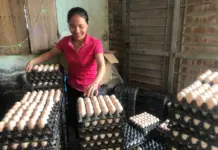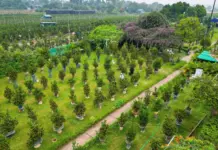Scientists from the Institute of Biology of the Russian Academy of Sciences have examined samples such as bricks and adhesives that were experimented on the sanctuary’s Tower B cluster since 2015 to help the management board and partners seek materials similar to the original ones to build Cham temples.
Basudev Kumar, who head of the Indian expert group, said after three years of implementing the preservation, Indian experts and Vietnamese partners have completed the restoration of Towers K and H, which are now ready to welcome visitors.
Indian experts are working to collect data to upgrade Tower A – which has the most valuable architectural and cultural values at the My Son sanctuary – from now to 2021, Ho said.
Once the religious and political capital of the Champa Kingdom, My Son Sanctuary is located in a hilly landscape in Duy Phu commune, Duy Xuyen district, about 70 km southwest of central Da Nang city and 40 km from Hoi An city.
It is comprised of eight groups of 71 monuments built throughout the 7th to 13th centuries.
The first construction of My Son dates back to the 4th century under the reign of Bhadravarman for the worship of God Shiva-Bhadresvara. Yet later on, the temple was destroyed.
At the beginning of the 7th century, King Sambhuvarman had it rebuilt and rebaptised Sambhu-Bhadresvara. Each new monarch came to My Son after his accession to the throne for the ceremony of purification and to present offerings and erect new monuments, which explains why My Son is the only place where Cham art flourished without interruption from the 7th to 13th century.




